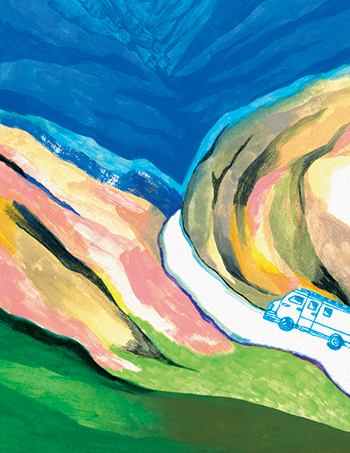
It was here, in the “off-grid” pocket between the Sangre de Cristo and San Juan mountain ranges, that Ted Conover ’80 first began volunteering in 2017 with a shelter and social services organization called La Puente to help with so-called “rural outreach.” This consisted primarily of driving the often great distances from homestead to homestead and offering his assistance with tasks that might range from finding boots or firewood to applying for government aid programs. After getting his feet wet among the locals, Conover marvels: “I had not known that this kind of place existed. This off-grid world … combined the soaring beauty of the Mountain West and resonances of the pioneers with the hard-bitten realities of life on a shoestring.”
Conover, a widely published journalist (The Atlantic, The New Yorker, Harper’s), who also teaches at New York University’s Arthur L. Carter Journalism Institute, wanted to find out what kind of people are drawn to the bare-bones proposition of cheap land and general solitude. Not long after introducing himself to the valley’s residents—by turns gun-toting and pot-growing, utopian idealist or MAGA-flag-waver, antisocial or eager for human connection—Conover found a trailer to live in. Soon after that, he bought his own little “piece of the rock.” He writes, “My project was to understand life on the flats, and ownership was a major part of that.”

Conover’s pioneering exploits in immersive journalism are legendary. They began when he was a student at Amherst.
Cheap Land Colorado: Off-Gridders at America’s Edge
By Ted Conover ’80
Knopf
Conover’s pioneering exploits in immersive journalism are legendary. His first book, Rolling Nowhere: Riding the Rails with America’s Hoboes, was based on research conducted as part of his Amherst thesis, during which he spent months as a railroad tramp. For Newjack: Guarding Sing Sing, he spent seven weeks training as a corrections officer before working in that prison for a year. It’s clear that the journalistic subjects that interest him the most are the people at society’s margins, who have either been cast off or gone off by their own accord. “Into the great openness of the flats,” he writes in Cheap Land, “flowed not only those seeking freedom in a good way but those seeking the freedom from their bad deeds of the past—or even freedom to do more bad.”
But much like Jessica Bruder ’00’s 2017 Nomadland, for which the author bought a camper van and lived among America’s migrant “van dwellers,” what keeps Cheap Land from becoming a gawping poverty safari is its humanist core. Conover is deeply committed to telling the stories of the people he encounters on the prairie on their terms, and when he’s dodging rattlesnakes or nearly freezing to death in his trailer, he considers it a privilege to be among those people, and to be seen as a neighbor. Even when encountering those who might be considered unsavory or inconvenient—people whose perception is warped with conspiracy theory, or who are suffering from addiction, or who are dealing with the consequences of all manner of criminal offenses—Conover’s first instinct is to establish a human connection, and his second is to lend a hand. For this reason, they are (more or less) always happy to offer him their perspective on the world.
“The American firmament was shifting in ways I needed to understand,” Conover writes in the opening pages, “and these empty, forgotten places seemed an important part of that.” The United States will probably never fully understand itself, but with this book, Conover has contributed an important document toward the effort. In fact, at times he seems at risk of never returning to his city life. “I felt good. I felt free and alive,” he writes. “When a place makes you feel like that, I think you should pay attention.”
Mancusi is a fiction writer and cultural critic. His debut novel, A Philosophy of Ruin, was published in 2019.
Illustration by Elisabetta Bianchi
Photo by Margot Guralnick